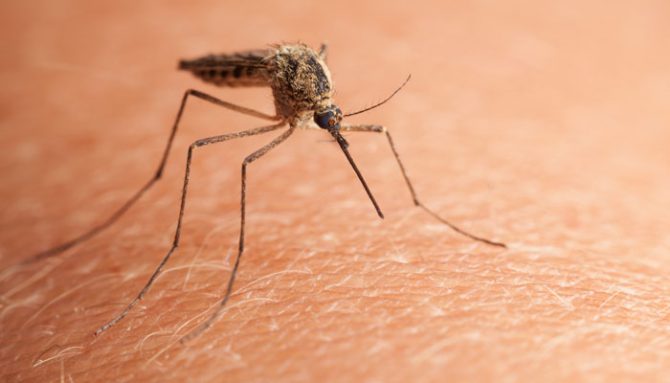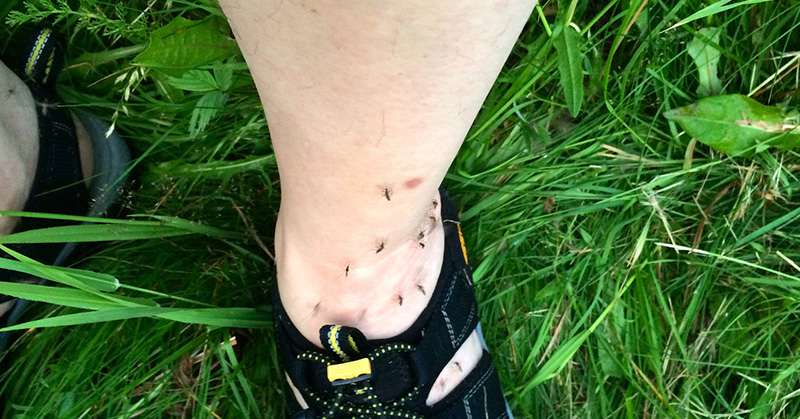It’s not in your head. Those summer evenings around the fire, trips to the beach, and family hikes through the trail where you were practically covered in mosquito bites while everyone else was left virtually untouched? Why do mosquitoes bite some people and not others? It turns out, there’s actually a scientific reason some people are much more attractive meals to mosquitos than others. Luckily, there are also extra things you can do to help prevent those itchy bug bites in the future.
Why do mosquitoes bite some people more than others?

There are several factors that influence those winged insects’ choice of meal, and unfortunately, almost all of them are out of your control. Here’s what makes some people more attractive to mosquitos:
Mosquitos Love Heavy Breathers
Mosquitos are attracted by our breath- specifically, the carbon dioxide that we all exhale. So, if you’re outside working up a sweat (more on that later) and increasing your breathing rate, you’re putting yourself on more mosquitos’ radar. Unfortunately, this can also affect people who sometimes struggle with heavy breathing even when inactive- people with severe asthma, obesity that affects their mobility, and pregnant women.
Mosquitos Prefer Sticky People
Your sweat has a few different ingredients, the most attractive of which to mosquitos is lactic acid. The more you sweat, the tastier you’ll seem. In fact, there has been some evidence that older sweat leads to more mosquito bites than “fresh” sweat. That’s why you might notice you’re getting more bug bites the longer it’s been since you last showered (looking at you, family camping trip).
Mosquitos Are Obsessed With Drinkers
Bad news for everyone who likes to enjoy a glass of wine or a cold one on the porch at night. A 2002 study demonstrated that the increased ethanol content in your sweat and breath when drinking increases mosquito attraction.
Mosquitos Have Taste… In Bacteria
Our bodies are teeming with bacterial cultures- it’s all a part of keeping our bodies healthy and in balance. But everyone’s microflora collection is a little different, and some types of bacteria work to repel mosquitos, while others are practically ringing the dinner bell.
A 2011 study found that people with generally more bacteria on their skin than average were more attractive to mosquitos (they tested feet specifically, so chances are, if you’re prone to smelly feet, you’re a target!). Researchers also identified that Staphylococcus bacteria was especially attractive for mosquitos, but Pseudomonas aeruginosa bacteria was unattractive.
Mosquitos Fancy Type O Blood (And A, too!)
A study showed that mosquitos land significantly more often on people with Type O blood, and people with Type A blood weren’t too far behind. Meanwhile, Types B and AB weren’t a big influence. It’s not clear why mosquitos would demonstrate this preference, though.
Keep Reading: The Anti-Skeeter Canopy Chair of Your Dreams. It’s Time To Enjoy The Outdoors, Bite-Free
How to Keep Mosquitos Away

It’s hard to suss out the answer to the question: why do mosquitoes bite some people more than others. While the most obvious answer might be to use bug spray, the active compound DEET has some associated health risks. Health Canada has even chosen to limit the legal concentration of DEET in mosquito repellants. The EWG has made their stance public, saying:
“Laboratory studies conducted since the EPA review have suggested that DEET exposure can affect the nervous systems of rats. People who use DEET daily have reported suffering symptoms including rashes, dizziness, difficulty concentrating and headaches. Studies using DEET alongside the pesticide permethrin have raised concerns that DEET could cause neurological damage and epigenetic changes.
Still, after reviewing the evidence, EWG has concluded that DEET is generally safer than many people assume and remains a viable option for people in areas infested with disease-carrying pests.”
So, while DEET products are still legal, and are generally safe for most people to use, there are several other more natural alternatives to use.
Natural Mosquito Repellants
- Mix lemon eucalyptus essential oil- with a carrier oil with a 1:10 ratio and distribute onto the skin. (Not to be used in the sun)
- Add lavender to your garden or use lavender essential oil mixed with carrier oil
- Throw thyme leaves into your campfire or apply thyme oil mixed with carrier oil to your skin
- Keep citronella candles burning (only under constant supervision)
- Apply tea tree oil mixed with carrier oil to the skin
Keep Reading: Girl Collects Every Mosquito She Has Killed
